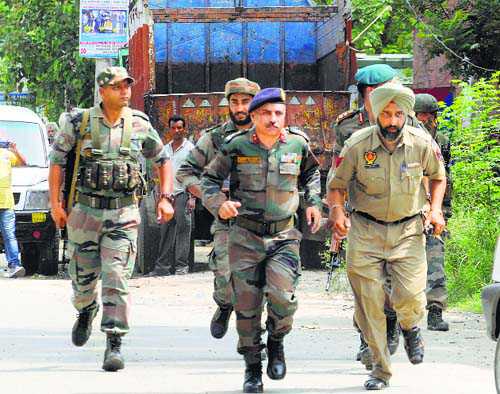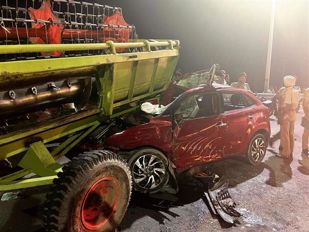
Army and Punjab police personnel taking position at the spot stormed by terrorists.
Arun Joshi
India is a divided nation when it comes to terrorism and the ways to counter it. This hurts. Terror attacks that aim at shaking the foundation of the nation are classified as Rajbagh, Jammu, Sopore, Kashmir, Delhi, Mumbai and now Gurdaspur attacks, as if these were a localised affair. These were not felt as something that should have instinctively touched the collective conscience of all the Indians as a nation.
The Dinannagar attack was a classic example of the Lashkar-e-Toiba’s “fidayeen strategy” that it adopted post-Kargil conflict in Kashmir. The LeT played out the game of “ choosing death” like “fidayeen”. The fidayeen attack is different from the suicide attack. The “fidayeen” walk into a situation where they fight until they are killed. Their terror play lasts for hours, sometimes even days. Most of the time these attacks are mounted pre-dawn, when the security personnel are bleary-eyed and their responses are sluggish. In suicide attacks, there is one big bang, some people get killed alongside the suicide bomber. That’s all.
To many Indians, Monday’s attack was Punjab Chief Minister Parkash Singh Badal’s problem or that of the Border Security Force, which should have guarded the international border with Pakistan more effectively. It was like Kashmir is Mufti Mohammad Sayeed’s problem or if something goes wrong in the North-East, the chief ministers of the seven states are responsible. At the most, the paramilitary forces or the Army would play their role in neutralising terrorists. That depends from place to place and people to people. That a terror assault in Manipur could reach our doorsteps is never thought, because the place is distant and the people involved there are not us.
Terrorism is not a law-and-order problem. Terrorism has global ramifications, it destabilises an established political system, cripples the economy and spirals into a crisis that affects one and all. The world starts viewing the hitherto peaceful places negatively. This type of fragmented approach to which Indians are used to is at the root of the biggest weakness in India’s counter-terrorism strategies. Currently, only a skewed view is taken which disables the broader vision and inevitably leads to failure in devising an effective strategy to counter the menace of terrorism. There is hardly any occasion when Indians stand as a nation, except in times of war. Every day there cannot be a conventional war when the soldiers would fight on borders. Unlike war on borders, terrorism knows no boundaries. And, be sure 27/7, like 26/11, would neither be the first nor the last terror assault on the Indian soil. In short, each and every terror attack, from wherever it may emanate, is an attack on India.
After each attack, accusing fingers are pointed at Pakistan. There are solid reasons for that. Yaqub Memon, a co-conspirator in the 1993 Mumbai blasts, had spilled the beans and given every detail of Pakistan’s involvement. A farcical trial of 26/11 was underway in Pakistan. Terrorists come from across the LoC and the international border with Pakistan-occupied Jammu and Kashmir and Pakistan.
Pakistan has its own internal dynamics that makes it export terrorism to India. It cannot change its ways despite talk of talks with India and repeated utterances of peace with Delhi. The latest view is that the Salman Khan-starrer Bajrangi Baaijan’s appeal is sans borders. This synthesis gets broken with terror attacks. Besides, the constantly shifting talk on talks, which tend to become conditional once the Prime Ministers depart with a promise to meet again, injects distrust. Prominent political scientist, Francis Fukuyama once said, “Where there is no trust, neither politics nor diplomacy works”. For example, soon after Narendra Modi’s meet with Nawaz Sharief in Ufa, Russia, a shocking discourse has started that Pakistan is reportedly preparing a dossier, containing a charge that India was behind the ghoulish massacre of the Army school children in Peshawar, Pakistan, on December 16 last year.
The documented facts of those chilling times are that Pakistan army chief Gen. Raheel Sharif had sworn action against Pakistan Taliban (PT) that had claimed the responsibility for the attack. PT had called it as a revenge for Pakistan’s military operations in North-Waziristan. PT had spine-chilling logic and was directed at the Pakistani army, “You killed our families and children, and we retaliated so that you feel the pain of the loss that we underwent.” These militants were the strategic assets of Pakistan before they turned against it for its military offensive against them. Where does India figure in it?Immediately after the cowardly attack at the army school in Peshawar, Pakistan Air Force (PAF) bombarded the hideouts of Pakistan Taliban, killing scores of them. The next to follow was the expeditious execution of Pakistani terrorists in prisons. That time, there was no talk of the Indian hand. Indian Prime Minister Narendra Modi had stood in Parliament and condoled the death of the innocent children and expressed complete solidarity with Pakistan. It is being done deliberately by Pakistan to enter into a denial mode.
It was Hafiz Saeed, the founder of Lashkar-e-Toiba, who gave birth to a new and anti-India narrative that Indian agents were behind the gory act. This terrorist –floated spin was picked up by a section of Pakistanis, who are in the habit of seeing everything going wrong in their country as something that Indians had conceived or executed. It’s a result of the perennial hatred against India. Pakistanis were caught in the pincer of two narratives, though a vast majority knew that it were their own home-grown terrorists, nurtured by the Pakistani establishment, who had killed their children. With such an attitude on part of Pakistan, the grim reality is that terror attacks will not cease in India. India is different. For its own sake, it should have a counter-terrorism policy not based on the rhetorical boasts that “a befitting reply” would be given. Nor can it be based on shifting theories on counter-terrorism.
Though spoken in a different context, Harvard professor Lawrence Summers’s words are relevant, “One good example is worth thousand theories.” Indian policy, if any, gets lost in the divided political approach. Once, the terror attack, wherever it takes place, is seen and felt as an attack on India, the policy would appear on the horizon without any delay. Let Dinanagar serve as a wakeup call.



























